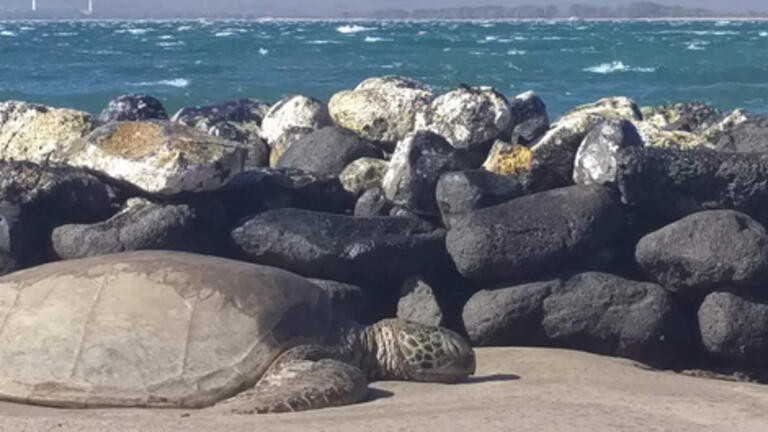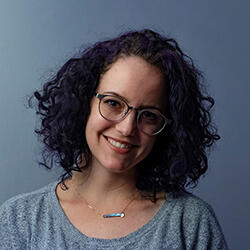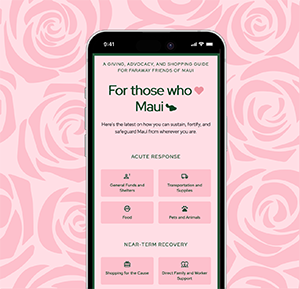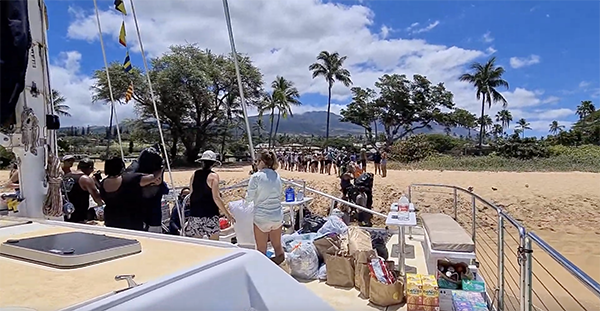MDes Student Launches Website for Aid to Maui


Uluwehi Mills, a second year MDes student at Carnegie Mellon University’s School of Design, recently launched Maui on My Mind, a website that serves as a giving, advocacy, and shopping guide for faraway friends of Maui. After suffering the deadliest natural disaster in the state of Hawaii’s history, Maui on My Mind looks to be a resource for faraway supporters to give with impact, and for Maui residents to have something that’s easy to share with loved ones.
“There’s this concept in Hawaiian culture—kuleana—which in the most superficial sense is defined as responsibility or duty,” said Mills, who grew up in Maui and is currently working on her thesis with indigenous-led educational organizations in Hawaii. “But Hawaiian words typically have multiple deeper meanings; I recently learned in a Hawaiʻi-focused ethical design cohort that kuleana is etymologically related to the word kūleʻa, which describes competency. The leaders of our cohort explained that this means our kūleʻa (talents) oblige us to use them to the benefit of our communities.”
In the wake of the wildfires, numerous close friends and colleagues from the continental United States wrote to check on Mills.

“They usually asked two questions: if I was safe, and what they could do to help,” said Mills. “I had an easy time answering the first question, but the second one took a lot of emotional and cognitive work—on that first day, all of us on Maui were shell shocked and grieving. But also, everything happened so quickly that there wasn't really a comprehensive centralized resource for people who wanted to help, especially for those who aren’t on Maui.”
Mills scoured social media, news articles, and mutual aid Google Docs to collect resources and share them out quickly, but things change so rapidly during a disaster like the wildfires that what is true when one day might not be relevant by the time someone has the opportunity to act on it.
“With the kūleʻa of my design training, I felt that building a resource that is both comprehensive and lowers cognitive load might better facilitate effective, timely support, both now and long-term,” continued Mills. “It would also relieve some degree of emotional burden on my community to assemble an answer to that question for their own continent-based people.”
Along with the challenge of setting up Maui on My Mind so quickly, Mills looked to design the site to be an effective tool for support outside of non-profit channels, including patronizing local businesses with fundraising campaigns and giving direct aid to affected families. This included leveraging GoFundMe’s collection of verified victims to allow mutual aid-oriented people to give directly to families, with a randomizer button in each section that could lower the cognitive load of picking the “right” project/family to support.
“I’ve worked with some incredibly talented people, including an engineer who saw the value in the project and helped me to set up an API on a personal server that would scrape up-to-date GoFundMe campaigns regularly,” added Mills. “I also asked every designer I happened to interact with over Zoom for a week to give feedback to ensure that the site would feel trustworthy, motivating, and shareable.”

Mills looks back fondly on her time growing up on Maui, but acknowledges the struggles the people of Maui face.
“I am incredibly fortunate to have grown up on Maui—we are an incredibly resilient community with deep cultural values,” said Mills. “We’re also a community that has been made extremely vulnerable by the paradise myth. The current economy is so singularly dependent on the tourism industry that on a typical day, one in three people on Maui is a tourist. When you visit Maui, it’s not long before you come across perfectly-landscaped resort towns and multi-million dollar estates neighboring parched fields and mountains in areas that were once lush wetlands. We have one of the highest costs of living in the country with one of the lowest average wages relative to cost of living. Coupled with a pre-existing housing affordability crisis, local families are being priced out at an alarming pace. Like many crises, the wildfires are the dramatic manifestation of several extant crises, many of which have resulted from our community’s gradual loss of self-determination.
“Philanthropy is an imperfect space—only as valuable insofar as it leads to greater community self-determination. Outside resources are important, and should go to support a diverse set of community-led efforts, because we need allies in action to regain agency after a long history of exploitation.”
Moving forward, Mills is eager to work with local think tanks to envision the long-term—to build on the ingenuity of their kupuna (ancestors) to rehabilitate the land and develop a community-centric economy.
“What I’ve learned is that in a community that has experienced a major tragedy, emotions are extremely heightened in all directions, and people need immediate answers and action,” said Mills. “There is no patience for official channels or comprehensive research. So in the immediate aftermath, I’ve aimed to use my skills as a designer to aid sensemaking and highlight the power of our community response.”
Please consider offering your support for the people of Maui through Maui on My Mind.